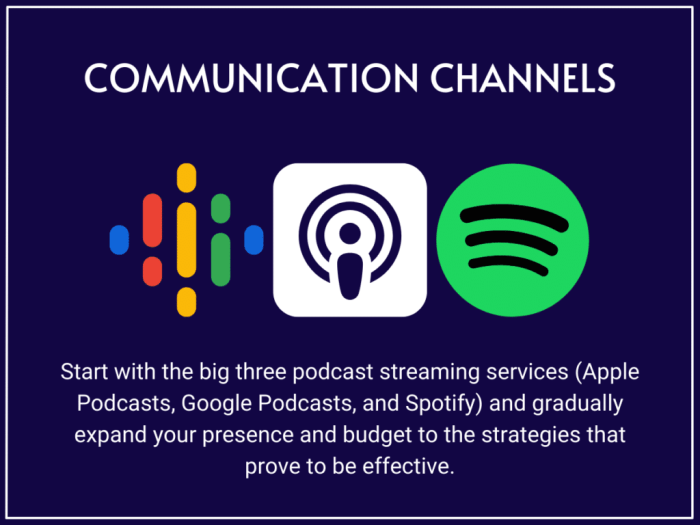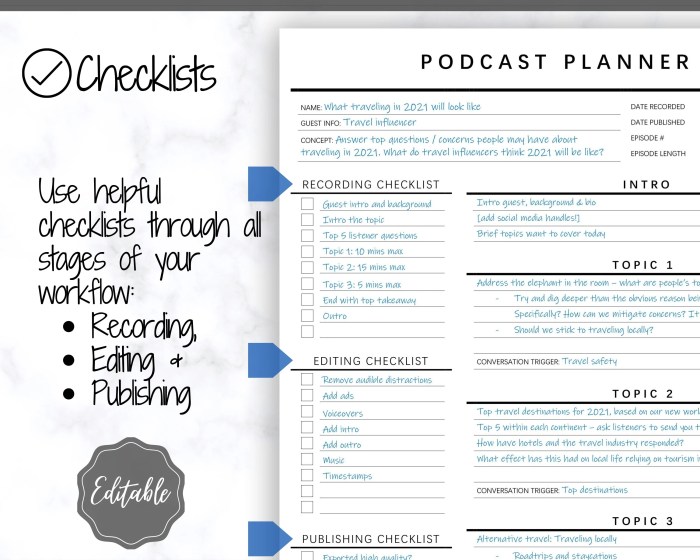Developing a Podcast Content Plan dives into the essential steps needed to create a successful podcast, exploring everything from setting objectives to structuring episodes, all with a cool high school hip vibe that keeps you hooked from the get-go.
Get ready to unleash your podcasting potential with this ultimate guide to planning engaging and captivating content that resonates with your audience.
Setting Objectives: Developing A Podcast Content Plan
When developing a podcast content plan, it is crucial to set clear objectives to ensure that the content created aligns with the overall goals of the podcast. This involves defining the purpose of the podcast, identifying the target audience, listing specific goals, and determining the tone and style that will best resonate with the audience.
Define the Purpose of the Podcast
- Establishing the podcast as a platform for sharing industry insights and expertise.
- Providing valuable information and entertainment to listeners interested in the topic.
Identify the Target Audience, Developing a Podcast Content Plan
- Young adults interested in exploring career options in the tech industry.
- Professionals seeking to stay up-to-date with the latest trends and developments in the field.
List Goals for the Podcast Content Plan
- Release bi-weekly episodes to maintain consistent engagement with the audience.
- Collaborate with industry experts for insightful interviews and discussions.
- Grow the listener base by 20% within the first six months of launching the podcast.
Determine Tone and Style
- Conversational tone to make complex topics more accessible and engaging.
- Incorporate humor and storytelling elements to keep listeners entertained and interested.
Content Research
When developing a podcast content plan, conducting thorough content research is crucial to ensure the success of your show. By understanding your audience preferences, analyzing successful podcasts in your niche, identifying trending topics, and exploring different formats, you can create engaging and relevant content that resonates with your target listeners.
Market Research and Audience Preferences
- Conduct surveys or polls to gather insights into what topics your audience is interested in.
- Use social media analytics to track engagement and determine popular content types.
- Listen to feedback from your listeners and adapt your content based on their preferences.
Analyzing Successful Podcasts
- Study the top podcasts in your niche to see what topics and formats are performing well.
- Take note of the tone, style, and structure of successful podcasts for inspiration.
- Identify key elements that make these podcasts appealing to their audience and consider how you can incorporate similar strategies into your own show.
Identifying Trending Topics
- Stay up-to-date with current events, industry trends, and popular culture to identify topics that are relevant and timely.
- Utilize tools like Google Trends or social media trend trackers to pinpoint popular themes that resonate with your target audience.
- Consider how you can put a unique spin on trending topics to make them fresh and engaging for your listeners.
Exploring Different Formats
- Experiment with various podcast formats such as interviews, solo episodes, roundtable discussions, or storytelling episodes.
- Determine which format best suits your content and goals, and be willing to adapt and evolve as needed.
- Engage with your audience to gather feedback on different formats and adjust your content strategy accordingly.
Episode Structure

When structuring each episode of your podcast, it’s essential to create a template that keeps your audience engaged from start to finish. Begin with a captivating introduction that sets the tone for the episode. Then, dive into the main content where you deliver the key information or discussion points. Finally, wrap up with a conclusion that summarizes the main takeaways and leaves your listeners wanting more.
Length of Episodes
The length of your episodes should be based on both the content you are covering and the preferences of your audience. Some podcasts thrive with shorter, bite-sized episodes around 20-30 minutes, while others may benefit from longer, more in-depth discussions lasting 45-60 minutes. Consider your topic, the amount of information you need to convey, and what your audience enjoys most when determining the ideal length for your episodes.
Segments Within Each Episode
Planning segments within each episode can help keep your content organized and engaging. Consider including an introduction where you introduce the topic and guests, the main content where you delve into the heart of the discussion, and a conclusion where you wrap up the episode and provide key takeaways. Additionally, incorporating calls to action throughout the episode can encourage listener interaction, such as asking for feedback, inviting them to join a discussion on social media, or prompting them to subscribe and share.
Guest Selection

When it comes to selecting guests for your podcast, it’s important to think about who can bring value to your show. Consider reaching out to industry experts, influencers, or thought leaders who can provide unique insights and perspectives. Diversity and inclusivity are also key factors to keep in mind, as they can help create a well-rounded discussion and appeal to a wider audience.
Be sure to prepare a pitch that clearly Artikels the expectations and benefits of being a guest on your podcast, making it an attractive opportunity for potential guests.
Brainstorming Potential Guests
- Make a list of individuals in your industry or niche who have expertise or interesting stories to share.
- Consider reaching out to authors, speakers, entrepreneurs, or professionals who can offer valuable insights.
- Think about potential collaborations with other podcast hosts or experts in related fields.
Reaching Out to Guests
- Craft personalized messages when reaching out to potential guests, highlighting why you believe they would be a great fit for your podcast.
- Clearly communicate the benefits of being a guest on your show, such as reaching a new audience or sharing their expertise with your listeners.
- Be respectful of their time and schedule when proposing a collaboration, offering flexibility to accommodate their availability.
